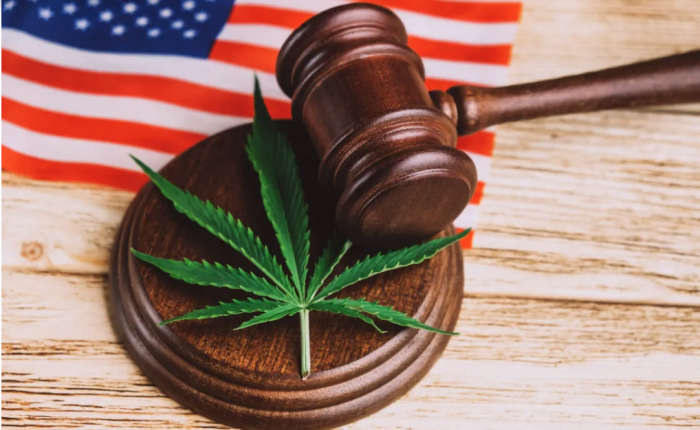The Marijuana Opportunity, Reinvestment and Expungement (MORE) Act, HR3617 passed on Friday, with a 220-204 vote in the House. Voting proceeded along party lines with Democrats voting 217–2 in favor and Republicans voting 3-202 against. Political analysts anticipate that the bill will face significant opposition as it moves to the Senate for review. Check out how your representatives voted on the legislation here.
So for those of you with your lighter at the ready, hang tight, this might not puff-puff-PASS.
Context: The MORE Act
The referendum is the second recent attempt by the House to pass legislation to decriminalize cannabis since 2020. The bill is poised to end federal prohibition and to provide states with the primary authority over cannabis policy. However, the MORE Act extends well beyond these efforts and aims to drastically advance cannabis industry social equity initiatives.
The bill would “end decades of failed and unjust marijuana policy,” Democratic Representative Ed Perlmutter said on the House floor.
“It is clear prohibition is over. Today we have an opportunity to chart a new path forward on federal cannabis policy that actually makes sense.”
– Reuters
More specifically, if approved by the Senate, the MORE ACT would also facilitate expungement programs for federal marijuana convictions. Additionally, it would impose a federal tax to create funds for social equity and small businesses. Moreover, it would also empower veterans to lawfully consult VA doctors concerning medical cannabis recommendations, among other things.
Despite growing support for federal legalization by two-thirds of Americans, this recent tally also highlights vast ideological differences between the two parties on how to address cannabis policy.
Consequently, it appears that most GOP lawmakers oppose initiatives that provide financial assistance and progressive services to communities that are most devastated by the federal prohibition on cannabis.
Opposing Views
Historically, Republicans opposed legalization efforts and have authored shamefully restrictive and racist cannabis laws. Over the years, these laws have devastated communities, deprived the chronically ill from safe access to medication, and perpetuated wildly inaccurate stereotypes about cannabis and its consumers. As a result, the most vulnerable members of our society have suffered disproportionately from federal prohibition.

Photo via Vox
More recently though, both House and Senate Republicans have demonstrated greater support for decriminalization. However, GOP members tend to oppose the social justice aspects that are included in the MORE Act (*think expungement programs and reparation funds).
Peter Meijer, a Republican Representative from Michigan told Insider that while he’s “generally supportive” of expungement efforts for cannabis-related offenses, he “took issue with linking that issue to legalization and decriminalization.” Moreover, Meijer stated: “I would prefer that we don’t link those two, and we focus on sort of the federal decriminalization.”
Conversely, most legalization advocates would likely argue that federal legalization is inherently married to the issues surrounding decriminalization and social justice.
Astonishingly, Steven Palazzo, a Republican from Mississippi, argued that federal legalization will hurt the nation’s youth: “The MORE Act does not end the war on drugs; all it does is poison our children and weaken our country.” – via Forbes
Similarly, Republican Representative Michelle Fischbach referred to the bill as “not only flawed but dangerous,” inferring that it did not protect minors and would encourage people to open marijuana businesses. However, some Republicans were far more terse, like Andy Biggs, a Republican from Arizona who called the legislation “a piece of garbage,” claiming it will promote business for illicit drug cartels.
Conversely, Democratic Representative Chris Pappas of New Hampshire voted to oppose the MORE Act because it failed to include his amendment, which he posits will close loopholes in state regulatory frameworks.
I support decriminalizing marijuana, taking it off Schedule I, and making important federal reforms so states can choose how to appropriately regulate these substances.
— Rep. Chris Pappas (@RepChrisPappas) April 1, 2022
But the MORE Act is not the right way to do this.
Read my statement: https://t.co/GaDKWSJFmo 1/5 pic.twitter.com/oi6nvUFNiN
Political Support for the MORE Act
Public servants in support of the MORE Act often praise its radically progressive pursuits. As a result, most Democrats are likely unwilling to negotiate or compromise on the social equity aspects of the bill.
House Speaker Nancy Pelosi has recently framed the legislation as a “criminal justice reform bill.” Pelosi has notably supported the legislation since 2020, stating, “this momentous step helps end the devastating injustices of the criminalization of marijuana that have disproportionately impacted low income communities and communities of color, and reflects the overwhelming will of the American people.” – via Speaker.gov
Similarly, Democratic Representative Ed Perlmutter said on the House floor that the bill will “end decades of failed and unjust marijuana policy.” Moreover, Perlmutter noted, “it is clear prohibition is over. Today we have an opportunity to chart a new path forward on federal cannabis policy that actually makes sense.” – via Reuters
However, MarketWatch reports that the MORE Act will be blocked by the Senate: “the measure will not likely pass the Senate, Beacon Policy Advisors LLC analyst Andrew Lokay said… the MORE Act would require 60 votes in the Senate, and it’s likely to fall short.”
The Tenuous Path Towards Federal Legalization
Now, if you paid attention in middle school history class (I for one, did not), you know that after passing the House, a bill is then reviewed and typically amended by the Senate, where if it is approved, it will then be signed into law by the President.
The legislative process gets a bit muddled here because there are currently multiple bills working through each chamber. Thus, in an attempt to demystify the process, for clarification purposes, the MORE Act is mainly supported by House Democrats–which is why it has passed for the second time.
Alternatively, in the Senate, the Cannabis Administration and Opportunity Act (CAOA), is expected to be introduced by Sen. Schumer, Sen. Booker, and Sen Wyden. However, Politico reports that Schumer and Booker refuse to hold a hearing on the Safe Banking Act (another proposed cannabis reform bill) until it considers other social justice provisions implicit to cannabis reform.
While Republicans are more enticed by the Safe Banking Act and other cannabis reform legislation that legalizes, taxes, and leaves the bulk of the regulatory framework for the states to figure out, Democrats see this as an opportunity to advance decades long social justice and criminal justice reform policies.
Therefore, the two chambers will likely face a predictable grid-lock on cannabis reform, once again.
More Content
THE RELATIONSHIP BETWEEN BACKWOODS AND HIP-HOP
TERPENES FOR ANXIETY: 3 TERPS IN CANNABIS WITH STRESS-RELIEVING PROPERTIES
RAPPER WEED: WHICH RAPPERS HAVE CANNABIS PRODUCTS IN THE MARKET? WHO ACTUALLY HAS THE FIRE?
11 COMPANIES THAT DON’T DRUG TEST THEIR EMPLOYEES FOR WEED
7 TIPS FOR MARKETING CANNABIS AND CBD ON TIKTOK AND INSTAGRAM










